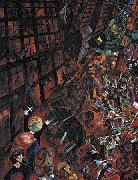Großhandels China Öl Gemälde & Rahmt Ein |
|||||||||||

|
|||||||||||
|
|
|
||||||||||||||
|
george grosz
george grosz(1893 to 1959),German painter, draughtsman and illustrator. He is particularly valued for his caustic caricatures, in which he used the reed pen with notable success. Although his paintings are not quite as significant as his graphic art, a number of them are, nonetheless, major works. He grew up in the provincial town of Stolp, Pomerania (now Slupsk, Poland), where he attended the Oberrealschule, until he was expelled for disobedience. From 1909 to 1911 he attended the Akademie der K?nste in Dresden, where he met Kurt G?nther, Bernhard Kretschmar (1889-1972) and Franz Lenk (b 1898). Under his teacher Richard M?ller (1874-1954), Grosz painted and drew from plaster casts. At this time he was unaware of such avant-garde movements as Die Br?cke, also active in Dresden. In 1912 he studied with Emil Orlik at the Kunstgewerbeschule in Berlin. A year later he moved to the Acad?mie Colarossi in Paris, where he learnt a free drawing style that swiftly reached the essence of a motif. |
||||||||||||||
|
|
||||||||||||||
|
||||||||||||||
|
|
||||||||||||||
| george grosz
george grosz(1893 to 1959),German painter, draughtsman and illustrator. He is particularly valued for his caustic caricatures, in which he used the reed pen with notable success. Although his paintings are not quite as significant as his graphic art, a number of them are, nonetheless, major works. He grew up in the provincial town of Stolp, Pomerania (now Slupsk, Poland), where he attended the Oberrealschule, until he was expelled for disobedience. From 1909 to 1911 he attended the Akademie der K?nste in Dresden, where he met Kurt G?nther, Bernhard Kretschmar (1889-1972) and Franz Lenk (b 1898). Under his teacher Richard M?ller (1874-1954), Grosz painted and drew from plaster casts. At this time he was unaware of such avant-garde movements as Die Br?cke, also active in Dresden. In 1912 he studied with Emil Orlik at the Kunstgewerbeschule in Berlin. A year later he moved to the Acad?mie Colarossi in Paris, where he learnt a free drawing style that swiftly reached the essence of a motif. 1917 - 18 Type Oil on canvas Dimensions 140 cm x 110 cm cyf |
||||||||||||||
|
Related Paintings to george grosz :. |
||||||||||||||
|
|
||||||||||||||
|
|
||||||||||||||
|
KONTAKTIEREN Sie UNS |







